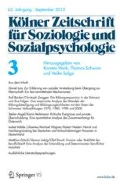Zusammenfassung
Die von 229 Angehörigen der ehemaligen Waffen-SS und SS und von 202 Angehörigen der Wehrmacht zwischen 1962 und 1966 ausgefüllten Fragebogen waren in der zuerst 1970 veröffentlichten Arbeit nicht vollständig ausgewertet worden. Die jetzt hinzugekommenen Einstellungsitems erweitern das Muster der autoritären Persönlichkeitszüge (F-Skala) in charakteristischer Weise. Die ursprünglich berichteten Gruppenunterschiede, welche mit soziodemographischen Merkmalen wie Schulbildung, Berufsschicht und Dienstrang konfundiert waren, konnten durch ein genaues Matching von Personen bestätigt und abgesichert werden. Die methodischen Grenzen dieser post hoc Untersuchung sind deutlich. Sie kann dennoch einen Beitrag zu der Frage leisten, welche Funktion der Autoritarismus sowohl im differentiell-psychologischen als auch im situativen Kontext des Gehorsamkeitsverhaltens hat.
Abstract
This is an updated study of the research published in 1970 on authoritarianism and its complexities with additional findings based on questionnaires. The respondents were 229 former members of the Waffen-SS and other formations of the SS matched and compared with 202 former members of the German Armed Forces. The questionnaires returned between the years 1962 and 1966 have not been completely analyzed. The additionally evaluated items have now enhanced the sample of authoritarian personality traits (F-scale) and thus their understanding. The originally reported group differences were confounded with socio-demographic characteristics such as schooling, occupational standing and service rank. In the present analysis, such variables were controlled by matching subjects. The earlier findings were confirmed. The methodological limitations of this post hoc investigation with its shortcomings are obvious. However, the findings nevertheless make a significant contribution to a better understanding of the function of authoritarianism in the context of differential psychological as well as situational conditions that promote unreflected obedience and its consequences. Last but not least, the findings also reflect a high correlation between authoritarianism and susceptibility to absolutist ideology such as National Socialism.
Literatur
Adorno, Theodor W., Else Frenkel-Brunswik, Daniel J. Levinson und R. Nevitt Sanford, 1950: The Authoritarian Personality. New York: Harper & Brothers.
Asendorpf, Jens B., 1996: Psychologie der Persönlichkeit. Grundlagen. Berlin: Springer.
Baumann, Zygmunt, 1989: Modernity and the Holocaust. Cambridge: Polity Press.
Billings, Steven W., Stephen J. Guastello und Mark L. Rieke, 1993: A Comparative Assessment of the Construct-Validity of Three Authoritarian Measures, Journal of Research in Personality 27: 328–348.
Blass, Thomas, 1993: Psychological Perspectives on the Perpetrators of the Holocaust: The Role of Situational Pressures, Personal Dispositions, and their Interactions, Holocaust and Genocide Studies 7(1): 30–50.
Browning, Christopher R, 1996: Ganz normale Männer. Das Reserve-Polizeibataillon 101 und die „Endlösung“ in Polen. Reinbek bei Hamburg: Rowohlt Verlag.
Christie, Richard, 1991: Authoritarianism and Related Constructs. S. 501–571 in: John P. Robinson und Phillip R. Shaver (Hg.): Measures of Personality and Social Psychological Attitudes, Vol. 1. San Diego, CA: Academic Press.
Dicks, Henry V., 1972: Licensed Mass Murder: A Socio-psychological Study of Some S.S.-Killers. New York: Basic Books.
Haney, Craig, Curtis Banks und Philip Zimbardo, 1975: Interpersonal Dynamics in a Simulated Prison, International Journal of Criminology & Penology 1: 69–97.
Kenrick, Douglas T., und David C. Funder, 1988: Profiting from Controversy. Lessons From the Person-Situation Debate, American Psychologist 43: 23–34.
Kleining, Gerhard, und Harriett Moore, 1968: Soziale Selbsteinstufung (SSE). Ein Instrument zur Messung sozialer Schichten, Kölner Zeitschrift für Soziologie und Sozialpsychologie 20: 502–552.
Lederer, Gerda, und Peter Schmidt (Hg.), 1995: Autoritarismus und Gesellschaft. Trendanalysen und vergleichende Jugenduntersuchungen von 1945–1993. Opladen: Leske + Budrich.
Meloen, Jos D., 1993: The F Scale as a Predictor of Fascism: An Overview of 40 Years of Authoritarianism Research. S. 47–69 in: William F. Stone, Gerda Lederer und Christie Richard (Hg.): Strength and Weakness: The Authoritarian Personality Today. New York: Springer.
Milgram, Stanley, 1974: Obedience to Authority. Reinbek bei Hamburg: Rowohlt.
Oliner, Samuel P., und Pearl M. Oliner, 1988: The Altruistic Personality: Rescuers of Jews in Nazi Europe. New York: Free Press.
Perzy, Anton, 1993: Dimensionen des autoritären Charakters. Phil. Diss. Universität Wien.
Sanford, R. Nevitt, Theodor W. Adorno, Else Frenkel-Brunswik und Daniel J. Levinson, 1950: The Measurement of Implicit Antidemocratic Trends. S. 222–288 in: Theodor W. Adorno, Else Frenkel-Brunswik, Daniel J. Levinson und R. Nevitt Sanford: The Authoritarian Personality. New York: Harper & Brothers.
Schuman, Howard, Lawrence D. Bobo und Maria Krysan, 1993: Authoritarianism in the General Population: The Education Interaction Hypothesis, Social Psychology Quarterly 55: 379–387.
Staub, Erwin, 1989: The Roots of Evil: The Origins of Genocide and other Group Violence. Cambridge, England: Cambridge University Press.
Steiner, John M., 1976: Power Politics and Social Change in National Socialist Germany. A Process of Escalation into Mass Destruction. The Hague, Netherlands: Mouton.
Steiner, John M., 1980: The SS Yesterday and Today: A Sociopsychological View. S. 405–456 in: Joel E. Dimsdale (Hg.): Survivors, Victims, and Perpetrators. Essays on the Nazi Holocaust. Washington D.C.: Hemisphere.
Steiner, John M., 2000: The Role Margin as the Site of Moral and Social Intelligence, Crime, Law and Social Change: An International Journal (im Druck).
Steiner John M., und Jochen Fahrenberg, 1970: Die Ausprägung autoritärer Einstellung bei ehemaligen Angehörigen der SS und der Wehrmacht, Kölner Zeitschrift für Soziologie und Sozialpsychologie 22: 551–566.
Stone, William F., Gerda Lederer und Richard Christie (Hg.): 1993: Strength and Weakness: The Authoritarian Personality Today. New York: Springer.
Zimbardo, Philip G., 1975: Transforming Experimental Research into Advocacy for Social Change. S. 33–66 in: Morton Deutsch und Harvey A. Hornstein (Hg.): Applying Social Psychology. Implications for Research, Practice, and Training. Hillsdale, New Jersey: Lawrence Erlbaum.
Zimbardo, Phillip G., 1994. The Psychology of Evil: A Situationist Persepctive on Recruiting Good People to Engage in Anti-social Acts. S. 186–204 in: Kurt Pawlik (Hg.): Bericht über den 39. Kongreß der Deutschen Gesellschaft für Psychologie in Hamburg. Göttingen: Hogrefe.
Zimbardo, Philip G., Craig Haney und W. Curtis Banks, 1984: Das Stanford Gefängnis-Experiment: Simulationsstudie über die Sozialpsychologie der Haft. Übersetzt und herausgegeben von Günter Bierbrauer und John M. Steiner. Coch: Bratt Institut für neues Lernen GmbH.
Author information
Authors and Affiliations
Corresponding author
Rights and permissions
About this article
Cite this article
Steiner, J.M. Autoritäre Einstellung und Statusmerkmale von ehemaligen Angehörigen der Waffen-SS und SS und der Wehrmacht. Koelner Z.Soziol.u.Soz.Psychol 52, 329–348 (2000). https://doi.org/10.1007/s11577-000-0035-5
Published:
Issue Date:
DOI: https://doi.org/10.1007/s11577-000-0035-5

